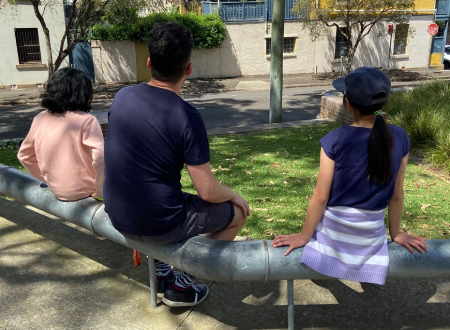How do you ask R U OK when you can’t or don’t see the children and young people in your life right now because of lockdowns and restrictions?

This is something we’ve been struggling with during lockdowns, as are many aunties, uncles, grandparents, family friends, teachers and counsellors.
As the other adults that children and young people can talk to when times get tough, we are all an important part of their support network. Often these are the people who “get them” differently to their parents or carers and can be an alternative sounding board.
Connection with supportive adults is a key factor in building resilience, and this is something we are always striving to create with our children and youth; that gentle, building of connection that leads to a place of trust, the confidence to reach out when you need help, or for the adult to be able to ask – R U OK?
So, what now, when we don’t see them as much, or face to face?
How we are checking in at The Girls & Boys Brigade
Here at The Girls & Boys Brigade we’re finding different ways to reach out to children and young people; connecting with children about their homework, having a quick chat when drop off weekly deliveries and doing Zoom dinners with our Youth. It’s more important than ever to keep in touch and let them know that all of their supports are still here, just in different ways.
How to ask children and youth R U OK?
Think about the children and young people in your life, whether they’re your own children or the children and young people you support along the way. Are you still managing to check in with them? A regular phone call or video call is a chance to normalise the distance we’re all experiencing and say “hey, it might look different but we can still chat, I’m still here”. If you’ve seen a change in their behaviour, let them know; “I notice you’ve been a lot quieter these last few days, how are you going?”. Talking about your own feelings can also be a good starter; “It’s difficult not being able to see my friends, how do you find it?”.
If you’re finding they don’t want to talk with you, there are other things you can do. Let them know you care and are there to talk when they need. Encouraging them to keep in touch with their own friends is important; we all know how easy it can be to hide away during lockdown and not want to connect with others. Suggesting a weekly phone call with at least one friend or another adult can help them to feel more connected. Walks in the park, as long as they’re within restrictions, are a good way to get in some exercise and also create that side by side scenario, where the lack of eye contact often makes children and young people feel more relaxed and talkative!
After You start the Converstation
Above all, be ready for the answer to be “no”. Be in the right headspace when you start a conversation and be ready to listen. We don’t have to solve every problem. Listening and letting them know you’re there to support them is the most important thing you can do. Let them know that together you can find the help they might need. Agree to check back in, and make sure you do. It’s a big step to say “I need help” and if we don’t follow up they might not feel brave enough to ask again.
Remember, you’re not alone either. If you’re concerned about changes in behaviour and attitude and are getting the silent treatment, try talking to the other adults who are in the child’s life. Are they seeing the same things? Have they been able to have a conversation with them?
Resources
Check out the great resources at R U OK for further ideas and support – and remember, a conversation could change a life.